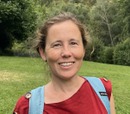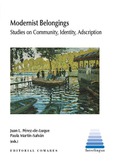Paula Martín-Salván

is Professor of English Literature at the University of Córdoba. Her research focuses on the representation of communities in contemporary American and British fiction, and her recent work discusses the dialectics between transparency and secrecy in the work of authors such as Jesmyn Ward, Colson Whitehead, Toni Morrison and Don DeLillo. She has co-edited the collections Figures of Belatedness: Postmodernist Fiction in English (2006), Community in Twentieth Century Fiction (2013), New Perspectives on Community and the Modernist Subject (2017), The Politics of Transparency in Modern American Literature (2024). She is also the author of monographs on Don DeLillo (2009) and Graham Greene (2015), and has recently finished a monograph on Colson Whitehead. She is the PI of the research project Poetics and Politics of Transparency in Contemporary Literature in English funded by the Spanish government (grant ref. PID2019-104526GB-I00), currently being implemented by researchers from the Universities of Córdoba and Granada.
Paula Martín-Salván es catedrática de Literatura Inglesa en la Universidad de Córdoba. Su investigación se centra en la representación de comunidades en la ficción contemporánea estadounidense y británica, y sus trabajos recientes analizan la dialéctica entre la transparencia y el secreto en la obra de autores como Jesmyn Ward, Colson Whitehead, Toni Morrison y Don DeLillo. Ha co-editado las colecciones Figures of Belatedness: Postmodernist Fiction in English (2006), Community in Twentieth Century Fiction (2013), New Perspectives on Community and the Modernist Subject (2017) y The Politics of Transparency in Modern American Literature (2024). También es autora de monografías sobre Don DeLillo (2009) y Graham Greene (2015), y ha finalizado recientemente una monografía sobre Colson Whitehead. Es investigadora principal del proyecto de investigación Poéticas y Políticas de la Transparencia en la Literatura Contemporánea en Inglés (ref. PID2019-104526GB-I00), actualmente desarrollado por investigadores de las universidades de Córdoba y Granada.


